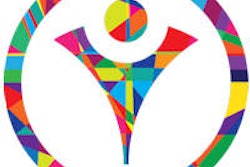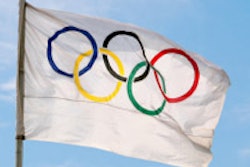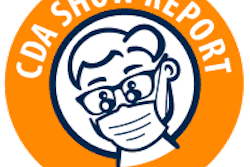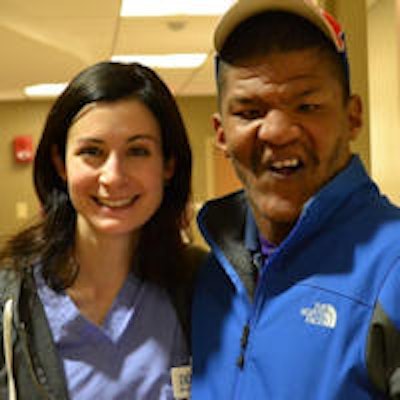
The Eastman Institute for Oral Health (EIOH), the Golisano Foundation, and the Special Olympics have partnered to improve access and oral healthcare for people with intellectual disabilities. The organizations recently hosted A Day for Special Smiles event, the first to take place in western New York state.
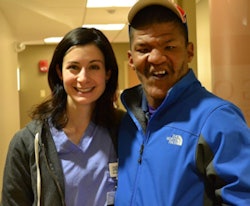 Lisa DeLucia, DDS, an assistant professor in the department of dentistry at the University of Rochester Medical Center School of Medicine and Dentistry, with Special Olympics athlete Mike Traver. All images courtesy of Eastman Institute for Oral Health, University of Rochester Medical Center.
Lisa DeLucia, DDS, an assistant professor in the department of dentistry at the University of Rochester Medical Center School of Medicine and Dentistry, with Special Olympics athlete Mike Traver. All images courtesy of Eastman Institute for Oral Health, University of Rochester Medical Center.Access to dental care is the most unmet healthcare need in children and adults with developmental disabilities, according to the EIOH.
"People with disabilities face many barriers to accessing high-quality healthcare, including difficulties in finding health providers who are trained and willing to treat people with disabilities and who will accept their insurance," stated Ann Costello, director of the Pittsford, NY- based Golisano Foundation, in a press release.
A new Special Olympics initiative, Special Olympics Healthy Communities, funded by a $12 million donation from the Golisano Foundation focuses on providing comprehensive, community-based healthcare and resources for this patient group, and educating healthcare professions. Those involved see it as the first step in closing this gap.
At the event, athletes received treatment for their most immediate dental needs, including baseline x-rays, full exams, fillings, and cleanings. More than 30 volunteer dentists, dental students, dental assistants, faculty, and staff provided the care at Eastman Dental Downtown, which donated the clinic space and time.
"Part of our mission is to care for the underserved, including people with intellectual disabilities, complex diseases, and geriatric patients, among others," said Dr. Eli Eliav, the director of the Eastman Institute for Oral Health. "We're committed to sharing our expertise in this area with the world, and are establishing fellowship and training programs to expand this vital educational initiative."
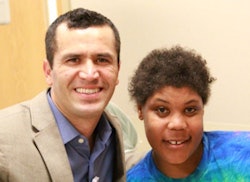 Abrahim Caroci, DMD, a resident at Eastman Institute for Oral Health, with patient Latisha Lucas.
Abrahim Caroci, DMD, a resident at Eastman Institute for Oral Health, with patient Latisha Lucas.Abrahim Caroci, DMD, a resident at the EIOH, proposed and organized the first A Day for Special Smiles in Arizona, and played an important role in establishing this second event in New York.
"We wanted to provide an experience for current and future dentists and oral health leaders to work with their local population with [intellectual disabilities' in order to forge a relationship that would last beyond the academic years," Caroci said.
Steven Perlman, DDS, founder of the Special Olympics' Special Smiles program and a clinical professor of pediatric dentistry at the Boston University Goldman School of Dental Medicine, emphasized the importance of improving access to dental care for these patients.
"The great thing here is that residents and faculty are creating a model that can be taken to other schools to follow," he said.
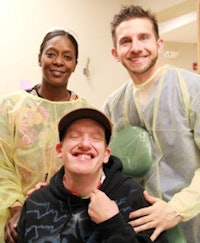 Patient Kristopher Warden (seated) with dental assistant Glendora Lester and Dr. Salvatore Colombo.
Patient Kristopher Warden (seated) with dental assistant Glendora Lester and Dr. Salvatore Colombo.For instance, Bharathi Gorantla, DDS, a first-year resident in the EIOH Advanced Education in General Dentistry program, had previously not had any interactions with adults with intellectual disabilities.
"I really enjoyed this experience today," Gorantla said. "I learned that taking a little extra time is beneficial in treating the patient, to allow for successful communication and comfort level for the patient."
This event was also the beginning of a longer comparison of the dental health of these athletes, according to Onolee Stephan, the director of the Community Health Program for Special Olympics in Rochester, NY.
"We want to compare the dental health of athletes who came to the Day for Special Smiles with those athletes who did not, to determine if the event has an impact on the number of athletes who receive dental care after being screened at a Special Olympics event," he said. "We also want to determine the impact of the event on dental providers' perceptions of people with intellectual disabilities before and after participating."




